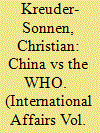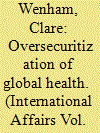|
|
|
Sort Order |
|
|
|
Items / Page
|
|
|
|
|
|
|
| Srl | Item |
| 1 |
ID:
167108


|
|
|
|
|
| Summary/Abstract |
This article studies a conflict over two competing norms in which the actors demonstrated incompatible positions not through arguments, but through actions. During the SARS crisis, China and the World Health Organization (WHO) entered a norm conflict over the precedence of sovereignty or global health security. Both resorted to behavioural, not discursive contestation: while the WHO practically but not rhetorically challenged the sovereignty norm by acting according to the norm of global health security, China—without openly acknowledging it—contravened the basic principles of global health security by acting according to the overlapping sovereignty norm. Why and with what consequences do actors choose to contest norms through actions rather than words? The article accounts for the resort to behavioural contestation by pointing to the strategic advantages it offers for furthering a contentious norm understanding without facing the social costs of making it explicit. It furthermore highlights that behavioural contestation may feed back into and change the odds of discursive contestation as its practical effects provide rhetorical resources to (de-)legitimate one or the other position. The propositions are illustrated in the interactions of China and the WHO during the SARS crisis and the subsequent norm development. This article forms part of the special section of the May 2019 issue of International Affairs on ‘The dynamics of dissent’, guest-edited by Anette Stimmer and Lea Wisken.
|
|
|
|
|
|
|
|
|
|
|
|
|
|
|
|
| 2 |
ID:
157970


|
|
|
|
|
| Summary/Abstract |
The rise of health issues such as HIV, pandemic influenza and Ebola on international agendas has led to the framing of threats to health as security issues. This has created an uneasy relationship between politics and health, by moving national interests into an area traditionally dominated by scientific rationalities and a predisposition towards cosmopolitan norms. Framing global health threats as risks, however, appears to be less politically charged and divisive, combining an aura of scientific objectivity with a moral call to action. In this article we argue that, despite its technical use in public health, in the policy discourse on global health the risk frame is not immune to values and interests but inherently political. It privileges a specific approach to global health policy which focuses on potential future catastrophes rather than presently existing health problems, emphasizes technological solutions rather than addressing the socio-economic determinants of health, while there is no single risk frame, but rather multiple risk frames existing simultaneously, as seen during the 2014–15 west African Ebola outbreak. However, framing health in terms of risk is useful in understanding how health issues reflect and contribute to the wider Zeitgeist concerning societal vulnerability: that dangers exist which are uncontrollable and are the product of technical progress. The risk frame allows us to place health issues into this wider context, where disease is just one of a number of concurrent dangers, rather than a separately identifiable hazard.
|
|
|
|
|
|
|
|
|
|
|
|
|
|
|
|
| 3 |
ID:
185855


|
|
|
|
|
| Summary/Abstract |
In November 2021, the World Health Assembly (WHA) is hosting a special session to discuss the proposed plans for a pandemic treaty. Despite the fact that there are scant details concerning the treaty, the proposal has gained considerable support in both the academic community, and at the international level. While we agree that in the wake of the numerous governance failures during COVID-19, we need to develop appropriate global solutions to be able to prevent, detect, respond to, and recover from future global health crises—and that such mechanisms should be rooted in global equity—we disagree, however, that this pandemic treaty, currently, is the most appropriate way in which to achieve this. Indeed, notions of global community, solidarity, fairness are far removed from the reality that we have seen unfolding in the actions of states responding to the pandemic. This is the crux of the tension with the proposed treaty: the balance between the ideal cosmopolitan worldview held by those in power in global health, and the practice of national security decision-making witnessed in the last 18 months. Indeed, we do not believe that a pandemic treaty will deliver what is being extolled by its proponents, and it will not solve the multiple problems of global cooperation in global health that supporters believe it will.
|
|
|
|
|
|
|
|
|
|
|
|
|
|
|
|
| 4 |
ID:
155483


|
|
|
|
|
| Summary/Abstract |
Based on 16 months of fieldwork conducted in Malawi and Zambia between 2005 and 2014, this article advances debates on North–South relations by providing an actor-oriented view of donor politics. Drawing upon 152 interviews, 104 focus group discussions and a series of observations, it demonstrates how local people instrumentalize the fuzziness of ‘empowerment’ discourses to gain resources, status and opportunities. Our analysis of how local people push back against top-down dictated policies and structures in international affairs is highly pertinent because of Africa's extreme dependency on external resources for the AIDS response. We argue that the malleability of ‘empowerment’ in the AIDS enterprise has strategic advantages for seemingly dependent people living with HIV. Through ‘performances of compliance’ that mimic dominant ideologies, ‘extraversion’ that plays up recipients' weakness in global structures, and silence and humour that extend beyond the limits of the spoken word, locals embrace the elasticity of ‘empowerment’ and show agency despite the constraints of poverty, aid dependence, hunger and unemployment. These actions close the space for actual transformation of local people's lives because they create power imbalances within communities, privileging some while silencing and disadvantaging others.
|
|
|
|
|
|
|
|
|
|
|
|
|
|
|
|
| 5 |
ID:
158718


|
|
|
|
|
| Summary/Abstract |
Women's social, economic and political equality and reproductive freedom have been rhetorically embraced by a majority of countries that have ratified international human rights treaties. At the same time, conservative states and non-state actors have waged a concerted campaign to undermine these principles at the United Nations. In this article, I trace the dynamics of what I call the strategy of norm spoiling. Norm spoiling is the process through which actors directly challenge existing norms with the aim of weakening their influence. Although utilizing traditional tools of norm entrepreneurship and human rights advocacy, it has distinctive characteristics. The reactionary nature of norm spoiling means norm challengers do not need to consolidate and institutionalize support for alternative norms in order to advance their agenda. Instead, they can frustrate and destabilize target norms through protracted efforts to block their development and diffusion. Moreover, because spoilers are united by shared antipathies rather than by a substantive vision of politics, spoiling coalitions are composed of unnatural and even counter-intuitive allies. Throughout the article, I document tactics used by women's rights spoilers as well as their impact on international treaties, declarations and related policies. Women's rights advocates would be wise to recognize these trends in order to defend progressive gains.
|
|
|
|
|
|
|
|
|
|
|
|
|
|
|
|
| 6 |
ID:
168423


|
|
|
|
|
| Summary/Abstract |
Linking health and security has become a mainstream approach to health policy issues over the past two decades. So much so that the discourse of global health security has become close to synonymous with global health, their meanings being considered almost interchangeable. While the debates surrounding the health–security nexus vary in levels of analysis from the global to the national to the individual, this article argues that the consideration of health as a security issue, and the ensuing path dependencies, have shifted in three ways. First, the concept has been broadened to the extent that a multitude of health issues (and others) are constructed as threats to health security. Second, securitizing health has moved beyond a rhetorical device to include the direct involvement of the security sector. Third, the performance of health security has become a security threat in itself. These considerations, the article argues, alter the remit of the global health security narrative; the global health community needs to recognize this shift and adapt its use of security-focused policies accordingly.
|
|
|
|
|
|
|
|
|
|
|
|
|
|
|
|
| 7 |
ID:
168424


|
|
|
|
|
| Summary/Abstract |
Even though most African states have signed and ratified the Framework Convention on Tobacco Control (FCTC), a global treaty to limit tobacco use, African states have been slow to pass and implement tobacco control policies like regulations on sales, smoke-free environments and taxes. This article examines how the ineffectiveness of local tobacco-control advocacy contributes to this suboptimal outcome. It asserts that the disconnect between the global tobacco-control advocacy network and local advocates shapes this ineffectiveness. With funding and direction predominately from the Bloomberg Initiative, local advocates emulate the funders' goal of achieving quick, measurable policy results. Their reliance on the network drives African advocates to strive to pass legislation, even in difficult political climates, and to remake their agendas when funders change their priorities. They also emulate the network's focus on evidence-based arguments that stress epidemiological data and biomedical interventions, even when this issue frame does not resonate with policy-makers. Financial dependence can draw local advocates into expectations about patronage politics, undermine their ability to make principled arguments, and lead them to downplay the ways that their home country's socioeconomic and cultural contexts affect tobacco use and control. Based on key informant interviews with African advocates, media analysis and the case-studies of Ghana and Tanzania, the article broadens the study of philanthropy in global health, it adds an African perspective to the literature on global health advocacy, and it deepens knowledge on power dynamics between external funders and local actors in the realms of health and development.
|
|
|
|
|
|
|
|
|
|
|
|
|
|
|
|
|
|
|
|
|